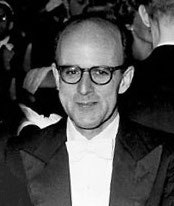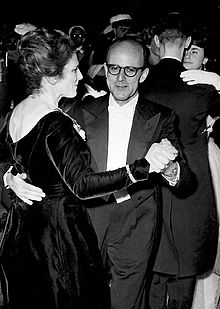Max Perutz
| Max Perutz | |
|---|---|
 | |
| Nascimento | 19 de maio de 1914 Viena |
| Morte | 6 de fevereiro de 2002 (87 anos) Cambridge |
| Nacionalidade | britânico |
| Alma mater | Universidade de Viena, Peterhouse |
| Prêmios |  Nobel de Química (1962), Medalha Wilhelm Exner (1967), Medalha Sir Hans Krebs (1968), Medalha Real (1971), Medalha Copley (1979), Medalha Otto Warburg (1993), Prêmio Lewis Thomas (1997) Nobel de Química (1962), Medalha Wilhelm Exner (1967), Medalha Sir Hans Krebs (1968), Medalha Real (1971), Medalha Copley (1979), Medalha Otto Warburg (1993), Prêmio Lewis Thomas (1997) |
| Orientador(es)(as) | John Desmond Bernal |
| Orientado(a)(s) | Francis Crick |
| Instituições | Universidade de Cambridge |
| Campo(s) | biologia molecular, cristalografia, bioquímica |
Max Ferdinand Perutz, OM, CBE (Viena, 19 de maio de 1914 — Cambridge, 6 de fevereiro de 2002) foi um biólogo molecular austríaco.
Conjuntamente com John Kendrew foi agraciado com o Nobel de Química de 1962, devido aos seus estudos sobre a estrutura das proteínas globulares.[1]

Conferências
Em 1980 foi convidado para participar das Royal Institution Christmas Lectures sobre The Chicken, the Egg and the Molecules (A galinha, o ovo e as moléculas).
Obras
- 1962. Proteins and Nucleic Acids: Structure and Function. Amsterdam and London. Elsevier
- 1989. Is Science Necessary? Essays on science and scientists. London. Barrie and Jenkins. ISBN 0-7126-2123-7
- 1990. Mechanisms of Cooperativity and Allosteric Regulation in Proteins. Cambridge. Cambridge University PressISBN 0-521-38648-9
- 1992. Protein Structure : New Approaches to Disease and Therapy. New York. Freeman (ISBN 0-7167-7021-0)
- 1997. Science is Not a Quiet Life : Unravelling the Atomic Mechanism of Haemoglobin. Singapore. World Scientific. ISBN 981-02-3057-5
- 2002. I Wish I’d Made You Angry Earlier.Cold Spring Harbor, New York. Cold Spring Harbor Laboratory Press. ISBN 978-0-87969-674-0
- 2009. What a Time I Am Having: Selected Letters of Max Perutz edited by Vivien Perutz. Cold Spring Harbor, New York. Cold Spring Harbor Laboratory Press. ISBN 978-0-87969-864-5
Bibliografia
- Brown, Andrew, 2005. J.D. Bernal: The Sage of Science. Oxford University Press. ISBN 0-19-920565-5
- De Chadarevian, Soraya, 2002. Designs For Life: Molecular Biology After World War II. Cambridge Univ. Press. ISBN 0-521-57078-6
- Dickerson, Richard E., 2005. Present at the Flood: How Structural Molecular Biology Came About. Sinauer. ISBN 0-87893-168-6;
- Ferry, Georgina, 2007. Max Perutz and the Secret of Life. Published in the UK by Chatto & Windus (ISBN 0-701-17695-4), and in the USA by the Cold Spring Harbor Laboratory Press.
- Finch, John; 'A Nobel Fellow on Every Floor', Medical Research Council 2008, 381 pp, ISBN 978-1-84046-940-0; this book is all about the MRC Laboratory of Molecular Biology, Cambridge.
- Hager, Thomas, 1995. Force of Nature: The Life of Linus Pauling. Simon & Schuster. ISBN 0-684-80909-5
- Hunter, Graeme, 2004. Light Is A Messenger, the life and science of William Lawrence Bragg. Oxford Univ. Press. ISBN 0-19-852921-X.
- Horace Freeland Judson, 1979. "The Eighth Day of Creation: Makers of the Revolution in Biology". Touchstone Books, ISBN 0-671-22540-5. 2nd edition: Cold Spring Harbor Laboratory Press, 1996 paperback: ISBN 0-87969-478-5.
- Krude, Torsten, ed., 2003. DNA Changing Science and Society. Cambridge Univ. Press. ISBN 0-521-82378-1. Being the Darwin Lectures for 2003, including one by Sir Aaron Klug on Rosalind Franklin's role in determining the structure of DNA.
- Maddox, Brenda, 2003. Rosalind Franklin: The Dark Lady of DNA. ISBN 0-00-655211-0.
- Medawar, Jean: Pyke, David (2012). Hitler's Gift: The True Story of the Scientists Expelled by the Nazi Regime (Paperback). New York: Arcade Publishing. ISBN 978-1-61145-709-4 !CS1 manut: Nomes múltiplos: lista de autores (link)
- Olby, Robert; 'Perutz, Max Ferdinand (1914–2002), Oxford Dictionary of National Biography, online edn, Oxford University Press, Jan 2008.
- Paterlini, Marta, 2006. Piccole Visioni: La Grande Storia di una Molecola. Codice Edizioni. ISBN 88-7578-052-8
- Ridley, Matt, Francis Crick: Discoverer of the Genetic Code (Eminent Lives). HarperCollins Publishers. ISBN 0-06-082333-X.
- Sayre, Anne, 1975. Rosalind Franklin and DNA. New York: W.W. Norton and Company. ISBN 0-393-32044-8.
- Watson, John D., 1980 (1968). The Double Helix: A Personal Account of the Discovery of the Structure of DNA. Atheneum. ISBN 0-689-70602-2. Gunther Stent edited the 1980 Norton Critical Edition (ISBN 0-393-01245-X).
- Wilkins, Maurice, 2003. The Third Man of the Double Helix: The Autobiography of Maurice Wilkins. ISBN 0-19-860665-6.
Referências
- ↑ «Chemistry Laureates: Fields». www.nobelprize.org. Consultado em 9 de agosto de 2018
Ligações externas
- «Perfil no sítio oficial do Nobel de Química 1962» (em inglês)
| Precedido por Melvin Calvin | Nobel de Química 1962 com John Kendrew | Sucedido por Karl Waldemar Ziegler e Giulio Natta |
| Precedido por John Fleetwood Baker, William Albert Hugh Rushton e Kingsley Charles Dunham | Medalha Real 1971 com Percy Edward Kent e Gerhard Herzberg | Sucedido por Wilfrid Bennett Lewis, Francis Crick e Derek Barton |
| Precedido por Robert Burns Woodward | Medalha Copley 1979 | Sucedido por Derek Barton |
 | Este artigo sobre um(a) biólogo(a) é um esboço. Você pode ajudar a Wikipédia expandindo-o. |












